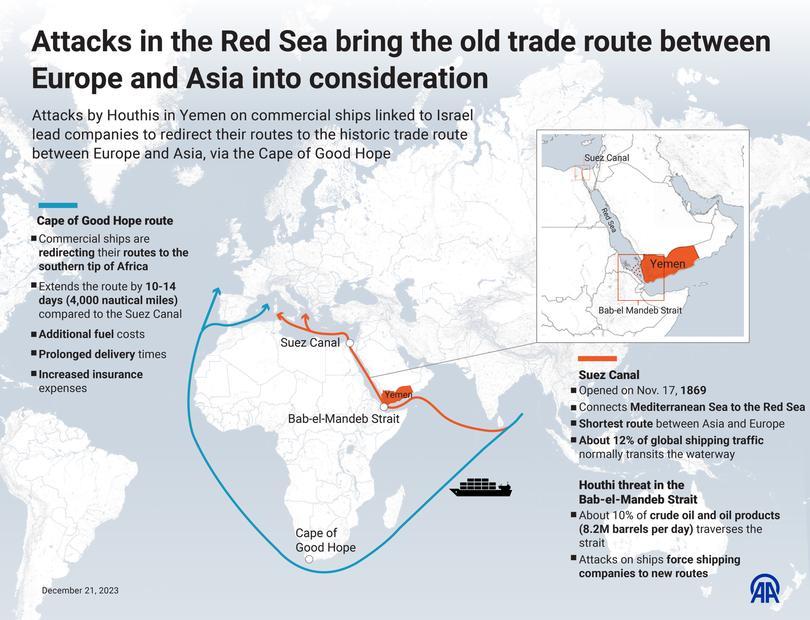Russia provided targeting data for Iran-backed Houthi assaults on Western ships in the Red Sea, reports
Russia is accused of providing targeting data to Yemen’s Houthi rebels to attack Western ships in the Red Sea.

Russia is accused of providing targeting data to Yemen’s Houthi rebels to attack Western ships in the Red Sea earlier this year, in bombardments that shuttered the major route for global trade and further destabilised the region.
The Houthis, a rebel military group backed by Iran, has fired missiles and drones at Israel’s Red Sea port in Eilar in support of Palestinian militants Hamas. The attacks have choked off most access to the key shipping route for much of the last year of the war in Gaza.
A source familiar with the strikes and two defence officials have said the Yemeni group eventually began using Russian satellite data as it expanded its strikes.
Sign up to The Nightly's newsletters.
Get the first look at the digital newspaper, curated daily stories and breaking headlines delivered to your inbox.
By continuing you agree to our Terms and Privacy Policy.A source told Dow Jones the data was passed through members of Iran’s Islamic Revolutionary Guard Corps, who were embedded within the Houthis.
The revelation positions Russia on the side of the Iran-backed Houthis, which the US designates a terrorist group, and is a demonstration of how far Kremlin President Vladimir Putin is willing to go to undermine the US and broader Western political and economic order.
A spokesman for the Russian government didn’t immediately respond to Dow Jones’ requests for comment. A Houthi spokesman declined to comment.
The Houthis began targeting the Red Sea — where ships travel to and from the Suez Canal — late last year in protest of Israel’s invasion of Gaza. The group has attacked more than 100 ships since November 2023, sinking two and hijacking another.
The attacks have caused major disruptions to global trade and prompted shippers to divert vessels around the longer and more expensive south around the Cape of Good Hope.
Tanker traffic through the Bab al-Mandab strait — which separates the Red Sea and the Indian Ocean where one in 10 barrels of oil are shipped every day worldwide — was 77 per cent lower in August 2024 than in October 2023, according to data from maritime intelligence company, Windward.

The US has vowed to protect international shipping lanes and launched a multinational naval coalition to escort ships travelling the strait. By April, it had spent some $1 billion on munitions to eliminate Houthi missiles and drones threatening ships in the Red Sea.
Earlier in October, the US sent B-2 Spirit bombers to strike Houthi munitions, supplies, and bunkers.
Since the Houthis started attacking Western vessels in the Red Sea almost a year ago, most ships have started switching off their radio signals in a bid to complicate efforts to track them.
Once a vessel goes ‘dark’, its live movements can only be accessed through high-quality satellite imaging as commercial satellite services are prone to coverage gaps and delays in transmission.
Russian cargo has been struck by Houthi strikes on several occasions, with the rebels attacking tankers that are part of a so-called “ghost fleet” — those being ships owned by shell companies for Russian companies to evade sanctions.
According to Dow Jones, the US holds concerns Russia could escalate the situation further by providing the militia anti-air missiles to counter US defences. There is no evidence Russia has done so.
The Wall Street Journal has reported that Russian arms dealer Viktor Bout — who was released from a US prison in a swap with Moscow — was trying to broker the sale of about $10 million worth of automatic small arms to the Houthis. It is unclear whether Russia had initiated or approved the sale.
Analysts have posited that Moscow is keen to stoke instability in the Middle East and Asia more broadly to keep resources and attention away from its ongoing invasion of Ukraine — or from any rising threats from Russia and China.
Russia has pulled Iran and North Korea deeper into its Ukraine war effort, with both countries providing ammunition to the Kremlin’s invasion. North Korea has also reportedly sent 3000 troops to train in Russia in recent weeks, according to US and South Korean officials.
Russian President Vladimir Putin did nothing to quash the reports of satellite image evidence of the troops’ movements, telling reporters at a BRICS bloc summit: “If there are images, they reflect something”.
The shift to reportedly assisting the Houthi’s strikes on the key Israel shipping port and the Middle East comes after Putin cut turned away from the Jewish state and Prime Minister Benjamin Netanyahu to strengthen his ties to Iran.
Putin has criticised the US and Israel over the conflict in Gaza. On Thursday, he said the region was on the brink of all-out war.
